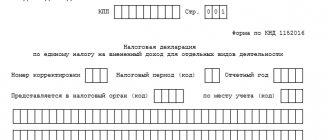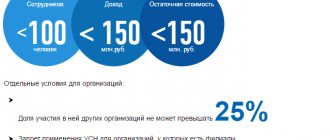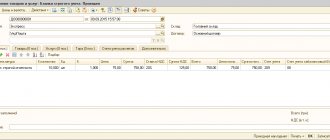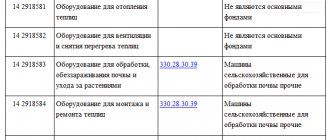» IP management » Cash desk
In June 2014, the Central Bank of the Russian Federation (hereinafter referred to as the Central Bank of the Russian Federation) published a set of special regulations regulating the procedure for conducting cash transactions. The objects of the settlement were equally legal entities, entities working in small businesses, and individual entrepreneurs (IP). The Central Bank proposed a simplified scheme for the functioning of the accounting system, which was quite favorably received by both small businesses and larger players in the modern economic space of the country.
A commission of experts, which included leading economists and lawyers of the Russian Federation, carefully developed an updated procedure for conducting cash transactions, according to which many outdated norms and regulations were eliminated, and all innovations were clearly structured and aimed at overall simplification and liberalization of the activities of the cash accounting system .
The document in question is a fairly detailed instruction that describes the step-by-step process of carrying out cash transactions and regulates many technical nuances associated with maintaining cash accounting.
Any modern accountant will undoubtedly be interested in learning in more detail about the nature of these changes and the possibilities of their practical application, which will help conduct cash transactions more efficiently. Not to mention the fact that entrepreneurial activity is impossible without knowledge of the basic rules for cash transactions that are relevant this year and the predicted changes in 2021.
- 2 Determination of the limit: the basis of cash accounting
- 3 Accounting regulation: rules for maintaining documentation
- 4 Liberalization versus formalism!
- 5 Recording cash flows as accounting
- 6 Simplified schemes for individual entrepreneurs
Introductory information
The regulatory legal act that regulates cash management is Bank of Russia Directive No. 3210-U dated March 11, 2014 “On the procedure for conducting cash transactions by legal entities and the simplified procedure for conducting cash transactions by individual entrepreneurs and small businesses.” This document was amended by Directive of the Central Bank of Russia dated June 19, 2017 No. 4416-U. The changes will take effect 10 days after publication (the document was published on August 8). Consequently, the procedure for conducting cash transactions changes from August 19, 2021.
Liberalization against formalism!
A further trend towards liberalization of accounting rules is predicted, since a certain softening of strict bureaucratic norms contributes to an increase in the economic efficiency of enterprises.
The procedure for registering cash transactions for 2021 has some exceptions in the sphere of organizing the life of organizations whose structure provides for the presence of separate divisions. If such a division is assigned the status of a legal entity, it operates according to the approved scheme and undertakes to maintain the documents provided for by regulations, and store excess funds in a bank account.
If it operates within the framework of a physical representative office, the funds are transferred directly to the legal entity, and the algorithm for their further placement remains the same.
According to the order, in 2021, a company or organization gains significantly greater freedom in organizing the cash register - that is, the space where the cash register is directly located. According to the new instructions, the cash register can be organized in any location convenient for the subject - for example, in a warehouse in a garage or even a car. An entrepreneur must keep records, first of all, based on his own economic interests and priorities.
The primary function of the cash register is to carry out cash transactions, so its arrangement should be as comfortable as possible and adapted to its functional purpose.
In addition, an organization or individual entrepreneur has the right to independently determine the measures and nature of protective actions related to ensuring the safety of cash that is currently in the cash register. The conduct of inspections, their timing and nature are also determined directly by the business entity.
Regarding the limit of cash available at the cash desk, the entity has the right to set it based on considerations of its own economic interest, without coordinating this issue with the banking institution. In addition, in the Russian Federation there is a rule according to which, if necessary, the value of the limit can be revised at any time, depending on the pace and dynamics of business development, the influence of external economic and legal factors and general market trends. The timing of the established limit is also subject to revision.
Accounting for cash profits that are in the cash register must be reflected in the documentation. Accounting can be carried out personally by an individual entrepreneur, the head of an organization, or a person specially hired to perform this function (company accountant).
Cash accounting today is carried out in accordance with established norms and required standards, but is quite variable with regard to the features of the organization of this process.
Why were the changes needed?
But why was it necessary to adjust the regulations on the procedure for conducting cash transactions? We can find the main answer in the explanatory note to the draft amendments being commented on:
What follows from the explanatory note
The development of the project is due to the introduction of online cash register equipment (online cash registers) from July 1, 2021, which ensures the storage of fiscal data in fiscal drives. See “Online ticket offices from July 1, 2021.”
The draft amendments clarify the procedure for issuing incoming cash order 0310001, and also provide for issuing outgoing cash order 0310002 for the total amount of accepted and issued cash when legal entities and individual entrepreneurs use cash register equipment.
Thus, the receipt and expenditure of funds will be verified with the data transmitted to the Federal Tax Service online.
The procedure for registering cash documents in electronic form is also being clarified and certain provisions of Directive No. 3210-U are being updated. We will tell you in more detail about the most significant adjustments to cash discipline from August 19, 2021.
The procedure for conducting cash transactions when using online cash register systems
Before the introduction of online cash register technology, sellers were guided by clause 5.2 of the Cash Management Procedure, drawing up a cash receipt order (CRO) at the end of the day for the total amount of cash received. The PKO was drawn up on the basis of the control tape removed from the cash register, strict reporting forms replacing the cash register receipt, and other documents specified in the law on cash registers dated May 22, 2003 No. 54-FZ. Now this paragraph of the Rules for Conducting Cash Transactions has been canceled, and one should focus on paragraph 4.1 set out in the new edition, which instructs organizations and individual entrepreneurs to draw up PKOs on the basis of “paper” or electronic fiscal documents - checks, BSO and others, in accordance with the law on cash register systems.
Money can be issued on account without an application
Accountable persons are employees to whom an organization or individual entrepreneur gives money to carry out official assignments and who are required to submit a report on their use.
To receive cash on account, the employee must write an application in any form, in which he must record the required amount and indicate for what purpose it will be spent. This follows from paragraph 6.3 of the Bank of Russia Instructions from the Bank of Russia dated March 11. 2014 No. 3210-U. A familiar application for the withdrawal of money from a cash register may look, for example, like this:
Thanks to the commented changes, from August 19, 2021, 2017, organizations or individual entrepreneurs will have the right to issue money on account based on an internal administrative document. The Central Bank did not provide for its name or form. Therefore, an organization or individual entrepreneur will be able to issue an order, instruction or any other administrative document on the issuance of funds. The form of the administrative document is arbitrary. However, it must contain records of the amount of cash and the period for which cash is issued, the signature of the manager and the date. This is required by clause 6.3 of the Bank of Russia Instructions from the Bank of Russia dated March 11. 2014 No. 3210-U (new edition).
Let's give a possible example of an organization's order to issue money against a report, which the director (or other authorized person) can issue in July 2021.
Please note that after August 19, 2021, it will be possible to work as before and issue reports based on employee applications. The Central Bank leaves this option acceptable. Previously, as we have already said, the statement was mandatory and the only possible option.
From August 19, 2021, upon receiving an application from an employee or an administrative document (for example, an order) to issue money for reporting, the accountant will be required to generate an expense cash order (0310002). An expenditure cash order is issued every time money is issued from the cash register. Draw it up according to form No. KO-2 in one copy (clause 4.1 of Bank of Russia Instructions No. 3210-U dated March 11, 2014). Here is an example of an expenditure and cash order drawn up in July 2017, where the order issued by the director, and not a statement, is recorded as the basis for the issuance of funds.
You can use this sample cash receipt order KO-2 as an example. Based on the generated cash register, the cashier is obliged to issue funds to the employee.
Pitfalls when checking cash discipline and cash register systems
From July 1, 2017, the Federal Tax Service of Russia tightened control over cash transactions and compliance with cash discipline. As a result, organizations that make payments to individuals and provide services to the public are required to use online cash registers. At the same time, there are companies and individual entrepreneurs that received a deferment until 07/01/2018, and some even until 07/01/2019. In this article, we will look at errors that occur in practice when working with an online cash register, as well as the main points that representatives of the Federal Tax Service pay attention to when checking compliance with the Law on CCP No. 54-FZ.
The procedure and features of checking cash discipline
In practice, it is rare, but there have been cases when sellers did not use cash registers when making payments to individuals when selling goods. The buyer, due to his ignorance, accepted ordinary sales receipts, and the seller, taking advantage of this, did not show the proceeds and did not pay taxes. Therefore, the tax authorities have tightened control over the completeness of revenue accounting in organizations and individual entrepreneurs (Article 7 of Law No. 54-FZ). The Ministry of Finance of Russia assigned the responsibility for monitoring the use of cash registers to the Federal Tax Service on the basis of orders No. 132n and 133n dated October 17, 2011 (hereinafter referred to as the Regulations on compliance with the requirements for cash register systems, Regulations on compliance with revenue accounting). When exercising control and supervision, tax authorities: - check compliance by organizations and individual entrepreneurs with the requirements of Law No. 54-FZ; — exercise control over the completeness of revenue accounting in organizations and individual entrepreneurs; — check documents related to the use of cash register systems, receive the necessary explanations, certificates and information on issues arising during inspections; conduct checks on the issuance of cash receipts; — impose fines in case of cash violations. Tax authorities have the right to conduct test purchases. Such a purchase is carried out by tax authorities in order to check whether the cash register user complies with the legislation on the use of cash register equipment. At the same time, it is checked whether he correctly draws up and issues (sends) cash receipts to customers or clients. Companies and individual entrepreneurs that carry out cash payments (settlements using payment cards), but without using cash registers, are also checked. In this case, it is checked whether they issue strict reporting forms or other documents required by law (Clause 2, Article 7 of the Law on the Application of CCP). The maximum period during which a test purchase is carried out is 5 working days from the date of the order to conduct an inspection (clause 19 of the Administrative Regulations, approved by Order of the Ministry of Finance of Russia dated October 17, 2011 No. 132n). The provisions of Law No. 294-FZ of December 26, 2008 on the protection of the rights of legal entities and individual entrepreneurs do not apply to test purchases when checking cash registers. Therefore, to carry it out, for example, there is no need to attract witnesses and coordinate it with the prosecutor’s office, as required by parts 4 and 5 of Article 16.1 of the said Law. During a test purchase, employees of the Federal Tax Service, like ordinary buyers, purchase goods, check the issuance or non-issuance of cash receipts when making cash and non-cash payments. The form of control is based on visual observation, as well as using video and audio methods of recording the facts of purchase and payment of goods by buyers (clients) (clause 23 of the Regulations on compliance with the requirements for cash register systems). The maximum period for completing this administrative procedure cannot exceed one business day from the date of assignment to a tax officer for this function (clause 24 of the Regulations on compliance with the requirements for cash register systems). After checking the issuance of a check, specialists from the Federal Tax Service Inspectorate provide the inspected entity with an order to carry out a test purchase by presenting their certificates (clause 28 of the Regulations on compliance with the requirements for cash register systems). The head of the organization being inspected records the fact of presenting an order to perform a state function with a signature indicating his position and the date of presentation in the order to perform the inspection. The result of the administrative procedure is recorded in the order for execution. If the head of the inspected organization refuses to sign the order, the Federal Tax Service employees will make a note in it indicating refusal to review it (clauses 28, 31 of the Regulations on compliance with the requirements for cash register systems). In the absence of an authorized representative of the organization or individual entrepreneur at the time of carrying out control activities and recording this fact in the order to carry out the inspection, the tax authority official has the right to acquaint any employee of the organization with the specified order, for example, a cashier-operator, a seller who made cash payments for goods sold (service provided or work performed), while simultaneously sending instructions to the inspected object through postal organizations, which does not contradict the provisions of these Regulations (Letter of the Federal Tax Service of Russia dated March 19, 2013 No. AS-4-2/4547). The maximum period for completing the administrative procedure cannot exceed two business days from the date of the order (clause 29 of the Regulations on compliance with the requirements for cash register systems). Tax inspectors check, among other things (clause 41 of the Regulations on compliance with cash register requirements): - serviceability of cash register equipment; — correspondence of the time on the cash receipt to the real one; — details on the check to identify corrections or falsification of information on it; — compliance of the actual location of the CCP installation with that indicated in the documents. In addition, tax officials may demand an explanation from you and involve specialists to conduct an examination (clause 41 of the Regulations on compliance with CCP requirements). This check must be carried out no later than five working days from the date of the order to conduct a test purchase (clause 42 of the Regulations on compliance with CCP requirements). As a result of such a purchase, an inspection report is drawn up. It is drawn up in two copies and signed by both the tax inspectorate and the cash register user (clauses 46, 52 of the Regulations on compliance with cash register requirements). If the user (his representative) is absent or refuses to sign it, tax authority employees will mark this in the act and send a copy of it to the organization by mail (clause 49 of the Regulations on compliance with CCP requirements). If violations are detected, tax officials initiate an administrative case. Therefore, if you have any comments or objections regarding the test purchase, reflect them in the act itself or in a separate explanation (clauses 48, 53 of the Regulations on compliance with CCP requirements). The act must be drawn up and transferred to the cash register user no later than five working days from the date of the order (clause 50 of the Regulations on compliance with the requirements for cash register systems). Inspectors have the right (clause 2 of article 7 of the Law on the application of cash registers, clause 7 of the Regulations on compliance with requirements for cash registers): - receive unhindered access to cash registers and fiscal data contained in the database of the fiscal data operator; — receive for verification documentation related to the acquisition, registration, re-registration and operation of cash registers; — receive the necessary explanations, certificates and information on issues arising during the inspection, including through the CCP office; — carry out checks on the issuance (direction) of cash receipts and BSO. If the inspected organization or individual entrepreneur has the right not to use cash register systems, inspectors check documents confirming the fact of settlements with buyers (clients). Inspectors can carry out such inspections through a test purchase, purchasing and paying for goods (work, services); — receive information about BSO generated by automated systems, filling out forms and issuing documents equivalent to cash receipts by an automated system; — interact with the internal affairs bodies of the Russian Federation; — bring to administrative responsibility for violations in the field of application of cash register systems. Most often, inspectors identify the following offenses: - non-use of cash registers; — the use of a cash register that does not meet the established requirements, or the use of a cash register in violation of the procedure for registration, re-registration and use; — failure to provide information and documents at the request of tax authorities (submission in violation of established deadlines); — failure to send (failure to issue) a cash receipt to the buyer (client). The imposition of an administrative penalty does not exempt one from fulfilling the obligation for non-fulfillment of which it was imposed (Part 4 of Article 4.1 of the Code of Administrative Offenses of the Russian Federation). The statute of limitations for bringing to justice for offenses related to the use of cash register devices is one year (Article 4.5 of the Code of Administrative Offenses of the Russian Federation). This period begins to be calculated from the day the offense was committed, and in case of a continuing offense - from the day it was discovered by the inspector (Parts 1, 2 of Article 4.5 of the Code of Administrative Offenses of the Russian Federation). A continuing offense should be understood as a long-term systematic violation of the procedure for applying the CCT (clause 14 of the Resolution of the Plenum of the Supreme Court of the Russian Federation dated March 24, 2005 No. 5 “On some issues that arise for the courts when applying the Code of the Russian Federation on Administrative Offenses”).
How to correctly reflect retail revenue?
According to paragraph 2 of Article 4.3 of Law No. 54-FZ, before the start of settlements using cash register systems, a report on the opening of a shift is generated, and upon completion of settlements, a report on the closure of a shift. In this case, the cash receipt cannot be generated later than 24 hours from the moment the report on the opening of the shift is generated. At the beginning of the shift, the accountant gives the cashier small change money according to the cash register. The cashier accepts money from customers and issues checks to them throughout the day. The buyer may request an electronic receipt. It must be sent in addition to the paper one. At the end of the shift, the cashier generates a Z-report and submits it, along with all the cash, to the accountant. The accountant accepts money under two PCOs: one for revenue, the other for the return of the exchange amount. And then records all settlement and cash settlements for the day in the cash book (clause 4.6, clause 4 of Directive No. 3210-U). If there are several cashiers, the accountant gives change money to one of the cashiers - the eldest. He distributes them to cashiers-operators, and at the end of the shift collects them back along with the proceeds. The transfer of money between the senior cashier and the others is recorded in book KO-5 (clause 4.5, clause 4 of Directive No. 3210-U). Revenue received at the cash desk without proper documentation or not processed on time (not on the same day) is considered unrecorded. Reflection in the cash book of not all cash documents executed during the day is an incomplete posting of cash, including revenue. This conclusion follows from the provisions of Bank of Russia Instruction No. 3210-U, according to which: - complete posting of cash to the cash register is the reflection in the cash book of incoming and outgoing transactions on the basis of each PKO and each cash register (clause 4.6, clause 4 of Instruction No. 3210- U); — the balance of cash in the cash register must be recorded in the cash book daily (clause 4.6, clause 4 of Directive No. 3210-U). The exception is those days on which cash transactions were not carried out (clause 4.6, clause 4 of Directive No. 3210-U). The fact that revenue is reflected in the cash book in an amount less than cash actually received using cash register is also recognized as incomplete recording of revenue (Resolution of the Supreme Court of the Russian Federation dated May 30, 2016 No. 306-AD16-1520 in case No. A72-7820/2015). Non-receipt or incomplete receipt of cash proceeds to the cash desk is one of the violations of the procedure for working with cash and the procedure for conducting cash transactions, for which the tax authorities may impose an administrative fine (Part 1 of Article 15.1, Part 1 of Article 23.5 of the Code of Administrative Offenses of the Russian Federation). IMPORTANT! Previously, when closing a cash register shift, the cashier, based on the Z-report data, had to fill out the cashier-operator log. During the audit, tax officials checked all the indicators reflected in the journal with the information in the Z-report. With the use of online cash registers, such an obligation has disappeared. If the cash register equipment was registered after February 1, 2017, then the organization is obliged to ensure the transfer of all fiscal data in the form of fiscal documents generated using the cash register equipment to the tax authorities through the fiscal data operator at the time of calculation (clause 6 of Article 1.2 Federal Law of May 22, 2003 No. 54-FZ). The online cash register already at the time of payment for goods, work and services transmits information about the calculations made to the tax authorities, and the organization does not have the obligation to keep a register of the cashier-operator and a register of meter readings. Documents intended for working with a regular cash register (cashier-operator's journal, KM-6 certificate) are currently not required for an online cash register (letter of the Ministry of Finance of Russia dated June 16, 2017 No. 03-01-15/37692, Federal Tax Service of Russia dated March 31 .2017 No. ED-4-20/6050). Thus, tax inspectors check the completeness of revenue reflection based on correctly completed cash documents and electronic cash receipts. Let us dwell in more detail on possible errors that occur among users of online cash registers.
Erroneous application of the CCT exemption
CCPs are required to use all organizations and individual entrepreneurs that use cash and (or) electronic means of payment in payments related (Article 1.1, paragraph 1 of Article 1.2 of Law No. 54-FZ): - with their sale of goods, works, services ; — with the organization and conduct of gambling and lotteries. Payments mean not only the receipt, but also the payment of funds. Electronic means of payment are, in particular: - bank cards; — electronic wallets; — bank transfers via online banking. Until July 1, 2021, CCP could not be used by organizations and individual entrepreneurs who: - performed work, provided services to the public with the issuance of BSO to customers (Parts 8, 9, Article 7 of the Federal Law of July 3, 2016 No. 290-FZ); — paid UTII or applied PSN (parts 7, 9, article 7 of the Federal Law of July 3, 2016 No. 290-FZ); — sold goods through vending machines (Part 11, Article 7 of Federal Law No. 290-FZ dated July 3, 2016, Letter of the Ministry of Finance of Russia dated December 19, 2017 No. 03-01-15/84966); - were not required to use cash registers in accordance with the Law on the Application of Cash Registers as amended on March 8, 2015 (Part 9, Article 7 of Federal Law No. 290-FZ dated July 3, 2016). But there is a circle of people who, at the legislative level, received a deferment on the use of online cash registers until 07/01/2019. These include organizations and individual entrepreneurs paying UTII, as well as individual entrepreneurs using PSN, subject to the issuance of a sales receipt, receipt or other document to the buyer instead of a cash receipt, as well as: - individual entrepreneurs who sell goods through vending machines and do not have employees, with by which employment contracts were concluded (Part 11.1, Article 7 of Federal Law No. 290-FZ dated 07/03/2016); — organizations and individual entrepreneurs that perform work and provide services to the public with the issuance of BSO to customers. However, when providing public catering services, they cannot refuse to use cash registers (Part 8, Article 7 of Federal Law No. 290-FZ dated July 3, 2016); — Individual entrepreneurs who have employees with whom employment contracts have been concluded. In practice, there have been cases where companies and individual entrepreneurs incorrectly interpreted the legislation on exemptions from the use of online cash registers. Most often, controversial situations arose due to the qualifications of the services provided. Services to the public mean services: - named in the collective classification group “Paid services to the population” based on OKVED2; — named in the collective classification group “Paid services to the population” based on OKPD2; - not directly named in collective groupings, but by their nature being services to the population (Order of Rosstat dated 05.23.2016 No. 244 (as amended on 07.03.2017) “On approval of collective classification groupings “Paid Paid services to the population” based on the All-Russian Classifier of Products by types of economic activities (OKPD2) OK 034-2014 (CPES 2008)"). IMPORTANT! When receiving payment for services from an individual to a current account by non-cash payment, you are required to use an online cash register as early as 07/01/2018 (letters of the Ministry of Finance of Russia dated 02/02/2018 No. 03-01-15/6172, dated 08/15/2017 No. 03-01- 15/52356, dated 03/12/2018 No. 03-01-15/15016). Many companies, for example, think that during distribution trade they can avoid using CCPs at all or use one CCP at different retail outlets. Of course, this is incorrect, since when registering an online cash register, you must indicate the address of the place of payment (Order of the Federal Tax Service of Russia dated May 29, 2017 No. ММВ-7-20/484). The buyer can always check on the tax website the authenticity of the receipt received during calculations and, if there is the slightest discrepancy, report this to the Federal Tax Service employees. As mentioned above, an individual entrepreneur operating on the basis of a patent may not use online cash registers. But it should be borne in mind that if the right to use PSN is lost, the individual entrepreneur switches to another taxation system, and in this case the individual entrepreneur is already obliged to use online cash registers and comply with all the requirements of the Law on Cash Register!
No receipt for non-cash payments and online transactions
The most important and significant mistake when receiving payment for goods (services) is the failure to clear an online check, since, according to officials, when making payments on the Internet using electronic means of payment, the organization is obliged to use cash register systems from the moment the execution of the order to transfer electronic means of payment is confirmed by the credit institution . From July 1, 2018, it is necessary to use cash register systems even when the buyer pays by payment order, that is, directly through a banking operator (letters of the Ministry of Finance of Russia dated August 15, 2017 No. 03-01-15/52356, dated April 28, 2017 No. 03-01-15 /26324, Federal Tax Service of Russia dated July 6, 2017 No. ED-3-20/4592). At the same time, they emphasize that to use when paying for goods or services on the Internet using electronic means of payment, excluding the possibility of direct interaction between the buyer and the seller, a special online cash register is required (letter of the Ministry of Finance of Russia dated May 5, 2017 No. 03-01-15/ 28069, dated 03/16/2017 No. 03-01-15/15260, dated 03/01/2017 No. 03-01-15/11618, dated 02/10/2017 No. 03-01-15/7516, dated 01/25/2017 No. 03-01- 15/3480). In case of payment through the seller’s website or using the Yandex.Money service, the user is also required to use cash register, but the check (or BSO, if we are talking about work or service) is not issued in paper form. It is sent electronically to the buyer’s subscriber number or email address at the time of payment. As in the case of regular trading, data is also transmitted to the Federal Tax Service of Russia through the fiscal data operator. Moreover, there are already special cash register models designed for conducting settlements using ESP (electronic means of payment) on the Internet, taking into account the specifics of such operations. They are integrated into the business process of online trading and generate a receipt at the time of settlement. Information about such models is in the cash register register, posted on the official website of the Federal Tax Service of Russia (clause 1, article 4, clause 5, article 1.2 of the Law on cash registers). In cases where the buyer pays on the Internet with a bank card, as a rule, a special online cash register is used, which is intended only for payments by electronic means of payment on the Internet. Such a cash register does not print checks, but ensures their transfer to customers in electronic form to the email address or subscriber number they specified (clause 1, article 4, clause 5, article 1.2 of the Law on the Application of Cash Register Systems). The receipt must indicate the address of the seller’s website (Clause 1, Article 4.7 of the Law on the Application of CCP). A special online cash register for payments on the Internet is not suitable for those online stores that, in addition to trading via the Internet, also conduct regular trading. The fact is that the cash register for payments on the Internet is not used for other payments (clause 1, article 4.3 of the Law on the use of cash register systems). Therefore, it is more convenient for them to purchase a regular online cash register, which can be used for any calculations. When making payments with a bank card on the Internet, checks must be issued in electronic form (Clause 5, Article 1.2 of the Law on the Application of Cash Register Systems). For failure to fulfill this obligation, fines are provided (Part 6 of Article 14.5 of the Code of Administrative Offenses of the Russian Federation). Therefore, we recommend that the online store provide fields in the order form for the buyer to indicate a telephone number and (or) e-mail. If payments are received by the seller from a payment aggregator, which acts as a payment agent and transfers buyers’ funds through a special bank account, then the online store has no obligation to use cash register systems. The cash register system uses the aggregator (clause 12 of article 4 of the Law on accepting payments, clause 1 of article 1.2, article 1.1 of the Law on the application of cash register systems, Letter of the Ministry of Finance of Russia dated March 14, 2018 No. 03-01-15/15693). If payments are received by the seller directly from the buyer, and the aggregator is an operator of payment infrastructure services, then the cash register must be used by the online store.
Lack of receipt when processing return transactions
Inspectors of the Federal Tax Service of Russia can hold organizations and individual entrepreneurs accountable for not using online cash registers when returning money to the buyer for purchases made (Part 6 of Article 14.5 of the Code of Administrative Offenses of the Russian Federation). The cashier is obliged to punch the receipt, which is also reflected in real time thanks to the fiscal drive (Article 1.1, paragraph 1 of Article 1.2 of the Law on the Application of Cash Register). Moreover, when making a refund to the buyer, the cash register receipt must indicate the calculation indicator “return of receipts”. Before accepting the goods from the buyer and returning the money to him, obtain a return statement from him. Such a statement is the basis for the return of low-quality goods (clause 10.3 of the Methodological Recommendations for accounting and registration of operations for the receipt, storage and release of goods, approved by the Letter of Roskomtorg dated July 10, 1996 No. 1-794/32-5). However, in order to avoid claims from the tax authorities, we recommend that you obtain a similar statement when the buyer returns a quality product. The Federal Tax Service of Russia issued a letter stating that sellers who switched to online cash register systems may not use the unified forms KM-1—KM-9, including the KM-3 act on returning money to buyers. The argument is this: the new version of the Law on CCP provides for the application of only those by-laws that are adopted in accordance with it. And the resolution of the State Statistics Committee, which approved these unified forms, does not apply to them (Letter of the Federal Tax Service of Russia dated March 31, 2017 No. ED-4-20/6050). Please note that the letter does not say that it is possible not to draw up a report when returning money to customers. The point is that it is not necessary to use the KM-3 form. In addition, the execution of the act is presupposed by the regulations for inspections of cash registers and the posting of cash proceeds: they oblige the organization (IP) to submit this act to the inspectors upon their request. So if you are not comfortable with the shape of the KM-3, then you can either modify it or develop your own shape. But remember that your form must meet all the requirements for primary documents established by the Law on Accounting (Article 9 of Federal Law No. 402-FZ dated December 6, 2011 (as amended on December 31, 2017)). The new version of Law No. 54-FZ provides for a correction check, which is issued if it is necessary to correct sales data submitted to the Federal Tax Service. A correction check can be issued as directed by the tax inspector. For example, the 1C program provides the document “Correction check (Finance -> Correction cash receipts)”. The correction check does not change the state of the registers. When making adjustments to calculations that were made earlier, by virtue of paragraph 4 of Article 4.3 of Law No. 54-FZ, a correction cash receipt is generated after the generation of the report on the opening of the shift, but no later than the generation of the report on the closure of the shift. An online cash register correction check is issued when the seller needs to correct an error. If the check has not yet been punched at the time of returning the goods and the purchase is in the process of being processed, the cashier can make an adjustment or cancel the check and continue working. An already corrected check will be transferred to the fiscal data operator, and through him to the Federal Tax Service. If the check has already been punched and you need to make a return, you will need to issue a correction check (the so-called return of receipt). Such a check is also a fiscal document, and data about it is transmitted to the tax authorities in the same way as data about a regular check. If the buyer returned the goods not on the day of purchase, the buyer must pay the cost of the returned goods and issue a regular cash receipt with the sign “return of receipt”, and the money can be returned from the cash drawer of the online cash register. That is why it is important to take into account all the difficulties that cash register users encounter in practice in order to avoid liability for violation of cash discipline and the procedure for conducting cash transactions. Let us consider in detail what liability organizations and individual entrepreneurs can bear in this case.
Responsibility for non-use of CCP in calculations
Failure to use CCT in cases established by the legislation of the Russian Federation entails a fine (Part 2 of Article 14.5 of the Code of Administrative Offenses of the Russian Federation): - on officials (IP) - in the amount of 1/4 to 1/2 of the settlement amount without the use of CCT, but not less than 10,000 rub.; - for an organization - in the amount of 3/4 to one of the calculation amounts without using cash registers, but not less than 30,000 rubles. For small and medium-sized businesses, an administrative fine is replaced with a warning if their non-use of cash registers is discovered for the first time (part 1 of article 4.1.1, part 2 of article 3.4 of the Code of Administrative Offenses of the Russian Federation). The use of a cash register after July 1, 2021 without a fiscal accumulator, including one unilaterally deregistered by the tax authority, is considered as non-use of a cash register (Letter of the Federal Tax Service of Russia dated January 31, 2017 No. ED-4-20/1602). Repeated violation (non-use of cash register), if the amount of settlements without the use of cash register was, among other things, a total of 1,000,000 rubles. and more, entails (part 3 of article 14.5 of the Code of Administrative Offenses of the Russian Federation): - disqualification of officials for a period of 1 to 2 years; — administrative suspension of activities for up to 90 days in relation to individual entrepreneurs and organizations. The use of a cash register that does not meet the established requirements, or the use of a cash register in violation of the procedure for its registration, the terms and conditions of re-registration, as well as the procedure and conditions for its use entails (Part 4 of Article 14.5 of the Code of Administrative Offenses of the Russian Federation): - on officials (IP) - warning or administrative fine in the amount of 1,500 rubles. up to 3,000 rubles; - organization - warning or administrative fine in the amount of 5,000 rubles. up to 10,000 rub. Organizations and individual entrepreneurs must, at the request of the Federal Tax Service, provide information and documents related to the use of cash register systems (clauses 2, 4, article 5 of the Law on the application of cash register systems). Their failure to submit, as well as submission in violation of the established deadlines, entails (Part 5 of Article 14.5 of the Code of Administrative Offenses of the Russian Federation): - for officials (IP) - a warning or an administrative fine in the amount of 1,500 rubles. up to 3,000 rubles; - organization - warning or administrative fine in the amount of 5,000 rubles. up to 10,000 rub. Failure to issue a cash receipt or BSO to a buyer (client) or failure to send these documents in electronic form to the buyer (client) at his request entails (Part 6 of Article 14.5 of the Code of Administrative Offenses of the Russian Federation): - for officials (IP) - a warning or an administrative fine in the amount of 2 000 rub.; - organization - warning or administrative fine in the amount of 10,000 rubles. A fine for non-receipt (incomplete receipt) of cash to the cash desk can be imposed: - on officials (IP) - in the amount of 4,000 to 5,000 rubles; - for organizations - in the amount of 40,000 to 50,000 rubles. (clause 1 of article 15.1 of the Code of Administrative Offenses of the Russian Federation). The cashier is not an official who may be subject to a fine, since he does not perform organizational, administrative or administrative functions. A fine can be imposed, for example, on the chief accountant or the head of an organization (note to Article 2.4 of the Code of Administrative Offenses of the Russian Federation).
*** As we see, tax authorities have tightened control over the use of cash registers. Almost all companies and individual entrepreneurs are required to use online cash registers from July 1, 2021. Only a few received a deferment until 07/01/2019. Even in the case when the buyer pays with an online store by bank transfer or using an electronic wallet, it is necessary to use cash register systems from July 1, 2018 (Part 9 of Article 7 of the Federal Law of July 3, 2016 No. 290-FZ, letters from the Ministry of Finance of Russia dated 02/02/2018 No. 03-01-15/6180, dated 08/15/2017 No. 03-01-15/52356). We recommend that sellers responsibly comply with the Law on CCP No. 54-FZ.
You can issue money on account if you have a debt
Many people know that it is impossible to give accountable amounts from the cash register to an employee who has not yet accounted for the money previously received. Violation of this restriction may result in a fine of up to 50,000 rubles (Article 15.1 of the Code of Administrative Offenses of the Russian Federation). Let us remind you that this rule does not apply to cases where money is transferred to a card.
However, as of August 19, 2021, the situation changes. From this date, organizations and individual entrepreneurs will be able to issue an employee a new amount for reporting at any time. Even if the previously issued amount was not returned on time. This amendment was included in clause 6.3 of the Bank of Russia Instructions from the Bank of Russia dated 11.03. 2014 No. 3210-U.
Nobody canceled the return period
The period for which cash can be issued on account is not limited by law. If the deadline for the return of accountable amounts is set by the manager, then no later than three working days after its end, the employee must report for the money received (clause 6.3 of the Bank of Russia Directive No. 3210-U dated March 11, 2014). This deadline has not been canceled. However, now, even if the employee has not returned the accountable amounts within the prescribed period, he has the right to receive a new accountable amount of money.
Let us remind you that if an employee does not return the amount of the unspent advance on time, the money can be withheld from the salary. For these purposes, a collection order is issued - no later than one month from the day the period established for the report expires. However, it is possible to recover amounts from an employee if he does not dispute the basis and amount of deductions. Therefore, it is required to obtain the employee’s written consent to deductions. Otherwise, it will be possible to collect the debt only through the court (Articles 137, 248 of the Labor Code of the Russian Federation).
How to work with the cash register?
Once the cash register is registered with the inspectorate, you can begin to work. Each time you receive payment, punch out the receipt and give it to the buyer.
In addition to paper checks, there are now electronic checks. They are equal to ordinary ones. An electronic check must be sent to the client by mail if he pays online through the website. Also, a buyer in a regular store can ask to send him an electronic receipt. You are obliged to do this if technically possible.
The cash register automatically transfers the punched check to the fiscal data operator, and he sends you confirmation that he received it. After this, your role in operating the cash register ends. The fiscal data operator will do the rest. Previously, at the end of the day, the cashier-operator's log was filled out. There is no need to maintain it with an online cash register.
Submit reports in three clicks
Elba will calculate taxes and prepare business reports based on the simplified tax system and patent. It will also help you create invoices, acts and invoices.
Try 30 days free Gift for new entrepreneurs A year on “Premium” for individual entrepreneurs under 3 months
The receipt for the PKO can be sent by email
A cash receipt order is filled out when money is received at the cash desk. It is drawn up in one copy according to form No. KO-1 (clause 4.1 of Bank of Russia Instructions No. 3210-U dated March 11, 2014). The cash receipt order form consists of two parts:
- the cash receipt order itself;
- the tear-off part is a receipt (issued to the person who deposited the money).
If the amount of money indicated in the receipt coincides with the amount deposited, the cashier signs the order. Then he puts a seal or stamp on the receipt for the order (if the organization has a seal) and issues a receipt to the depositor.
As for the changes, the receipt for the electronic cash receipt order from August 19, 2021 can be sent to the depositor’s email. No need to print. Just hand out the receipt from the paper PKO, as before. First, we note that it was required to issue “paper” receipts, even if the RKO was generated in electronic format.
Features of filling out the cash book in 2016-2017
The choice of a paper or electronic version of the book depends on the number of incoming and outgoing cash orders per shift and the ease of filling out. It is more convenient to maintain electronic CC because you can enter more information into the columns and correct entries in case of erroneous data entry.
There are a number of requirements for filling out a paper cash book in 2016-2017:
- The person authorized to maintain the cash register (cashier) must make a record of cash balances. In this case, the balance of money at the end of the previous working day (or shift) must be equal to the balance at the beginning of the next day (shift). Information on the payment of wages or other similar expenses (for example, payments upon dismissal of an employee at the initiative of the employer, etc.) is indicated separately.
- To accurately transfer data, at the beginning of each working day, the cashier must fold the tear-off part of the sheet under the part that remains in the cash register, and insert carbon paper between them.
- If there are many entries in the book and one sheet is missing, the person in charge writes the word “transfer” and begins filling out the data on the next page, putting the same date as on the previous sheet.
- At the end of the working day (shift), the chief accountant (or other authorized person) checks the cash book data with information from the PKO and RKO, and if everything is filled out correctly, signs and returns the cash book to the cashier. The detachable part of the book, PKO and RKO remain with the chief accountant for reporting.
Advice: in order to simplify financial reporting and interaction with consumers of goods, it is necessary to develop and print a branded sales receipt with the company logo, which will be issued upon customer request. To create a layout, you can use a standard example of filling out a sales receipt.
Not only the cashier has the right to maintain a cash book
Record information about cash flows in the cash book using Form No. KO-4. All organizations should do this. Only individual entrepreneurs who keep records of income and expenses or physical indicators in accordance with the Tax Code of the Russian Federation have the right not to create a cash book (clause 1, 4.6 of Directive No. 3210-U).
The cash book is kept by the cashier (clause 4, clause 4.6, clause 4 of Directive N 3210-U). However, from August 19, 2021, the Central Bank allows any employee, not just the cashier, to fill out the cash book. When the amendments come into force, the director will be able to fill out the book, for example (clause 4 of Directive No. 3210-U).
If, from August 19, 2021, the cash book will be maintained not by the cashier, but by another employee, then the corresponding responsibilities should be in his job description.
The cash book can be kept on paper or in electronic form (clause 4.7 of Instructions No. 3210-U).
Maintaining a cash book and issuing cash orders
A cash book in form No. KO-4 is necessary to keep records of cash transactions of cash receipts and withdrawals. All legal entities are required to maintain a cash book, but small businesses are allowed not to set a cash limit.
In addition, individual entrepreneurs may not issue receipts and expenditure orders at all, and not maintain a cash book, but only on the condition that they keep records of income, income/expenses, or physical indicators in accordance with the Tax Code of the Russian Federation (clause 4.1 of the Procedure). This is a simplified procedure for cash transactions for entrepreneurs.
With the entry into force of the amendments, the circle of persons who can make entries in the company's cash book has significantly expanded. If until August 19, 2017, only the cashier had the right to do this, now this can be any person authorized by the manager - an employee of the enterprise (clause 4 of the Procedure).
Registration of cash transactions upon receipt of cash is accompanied by the preparation of a cash receipt order in form No. KO-1. Unlike the “consumables”, the PKO consists of two parts - an order and a tear-off receipt with the seal and signatures of the cashier and chief accountant, which is handed over to the depositor of money. Previously, even if the PKO was issued electronically with electronic signatures, the receipt for transferring the “cash” to the depositor still needed to be printed on paper. Now, when generating a “receipt” in electronic format, the receipt can be sent to the depositor’s email if he asks for it. If the PKO in the organization is issued in “paper” form, the receipt is handed over exclusively in person (clause 5.1 of the Procedure).
The Central Bank has “simplified” some cash transactions. In an electronic cash receipt order, it is no longer necessary to verify the compliance of electronic signatures with the sample (clause 6.1 of the Procedure). The recipient of cash can also put his electronic signature on the electronic consumables (clause 6.2 of the Procedure).








